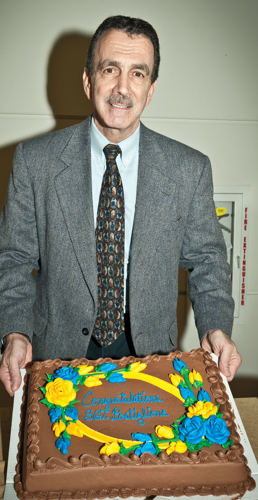
Sgt. Pat Postiglione
After almost 33 years with the Metro Nashville Police Department, not much gets past Sgt. Pat Postiglione. But family, friends and colleagues managed to pull the wool over the legendary detective's eyes when they pulled off a surprise party for him the weekend before his retirement last Thursday, Feb. 28.
"I was totally surprised," Postiglione admitted with a sheepish grin last week in a conference room at MNPD headquarters. "I thought my wife and I were going to somebody else's surprise party, and we walked in and those people were already there. It took me a second to figure it out."
Figuring it out is what Postiglione has done with uncommon tenacity, focus and determination — some would say obsessiveness — since his first day in the Homicide Unit on Sept. 1, 1987. His tenure culminated last week in cracking the 55th case in Metro's esteemed Cold Case Unit, a milestone announced in a press conference exactly one week before his last day on the job he is admittedly reluctant to leave.
"When you get a murder, you feel a responsibility to that victim," Postiglione says. "Anything you miss or don't do that you should have done, down the road it will come back on you. You don't want to be that guy."
Postiglione hasn't been "that guy" since his first case in Homicide, a less than stellar start to what turned into a stellar career. "A guy was killed in the Shady Lawn Trailer Park on Lebanon Road," he remembers. "It was my first case and I was the lead, but thank goodness there were other experienced homicide guys there too. One asked me if I had done the body chart. I said, 'What's a body chart?' I didn't know anything about any of that stuff. I had no idea what I was doing."
Prior to being tossed the keys to Car 310, Postiglione — whose heavy Queens accent has not been softened a whit by more than three decades below the Mason-Dixon — was a patrol officer for seven years.
"I came to Nashville on vacation and I liked the flavor of the South," he says. "I had always wanted to be a police officer and had applied in New York, but the list was so long. The Nashville police department was hiring, so I applied, got accepted, my wife and I moved here, and my first day was Aug. 1, 1980."
After several years on patrol, he put in a request for an investigative unit. "Back then, there was Homicide and there was Murder," Postiglione recalls. "If it's a known suspect and can be worked fairly quickly, that's Homicide. When you have a body in the woods, a body in a hotel room, with no obvious suspects, that gets assigned to Murder. It's a mystery death."
He got Homicide. His one year there, he had five deaths as well as rapes and assaults, all of which gave him lessons and experience he called upon down the road. It was one of the last homicides he worked that earned him a coveted spot on the Murder Squad.
"I got a call on a homicide on a young girl who was killed on Shelby Avenue," Postiglione says, "I went over there, but had to call Murder because there were no known suspects. Bill Pridemore was on that call, and he and I worked together — me in Homicide and him in Murder — seven months before we solved it. After, I began to get feedback from Sgt. [Robert] Moore that they might be interested in getting me over to Murder. I told them if they would take me, I'd go."
Sept. 1, 1988, was Postiglione's first day in the Murder Squad. It was also the start of what became a 20-year partnership with Pridemore, who retired in 2008.
"Whatever our partnership was, it was effective," Postiglione understates in his typically taciturn style. "We used to bounce information off each other, we would go back and forth all the time, we'd debate, we'd disagree, we'd discuss. In an eight-hour day, we'd probably argue for six. If he said the wall was blue, I would say no, it's not. I think that's what made it work. We worked very well together, and at the end of the day, we'd usually get the job done."
Postiglione also cites Moore as a mentor, whom he emulated early in his career.
"When we would have suspects, and I was new, I would follow his lead," he says. "I liked the way he did things, I liked the way he handled suspects and interviews, and I learned a lot about interviews from him. I took what I learned from him and kind of created my own style.
"My technique is always to stay even-keeled. I don't yell, I don't jump up and down or bang on the table. I want them to feel like I'm sympathetic in a way. You treat them with respect, even though you don't necessarily respect them.
"You have to be prepared and know the case intimately so the suspect won't have any wiggle room. You have to imply or suggest things in such a way that they won't know what you have. Don't let them know what you don't know. Let them think you know a whole lot."
In 2002, Deputy District Attorney Tom Thurman got permission from then-MNPD Chief Emmett Turner to create a Cold Case Unit based in the DA's office. The next year, Postiglione, by then a sergeant, was placed over the Murder Squad and the CCU, which came back to police headquarters in 2005 and remains there.

Sgt. Pat Postiglione
When Postiglione flew to a California prison two weeks ago, to charge inmate and former McGavock High School athlete Patrick Lamonte Streater in the 1996 double murder of Melissa Chilton and Tiffany Campbell, it represented the 55th cold case Postiglione has closed since 2005. (See "Waiting to Exhale," Feb. 28.)
"There's a lot of good detectives, a good team working every single day," he says, spreading the credit. "We worked relentlessly on that case for the last four years. It comes down to persistence, to staying with it, to never giving up."
He didn't give up until he arrested serial killers Paul Reid and Bruce Mendenhall, Perry March, Jerome Barrett and Streater — the men responsible for some of the most notorious murders in Nashville history.
But Postiglione says the deaths that barely made one news cycle haunted him as much as the high-profile cases, and he was just as driven to solve them.
One was the murder of a young woman on Oct. 4, 1991. "Donna Bacot was a young girl killed in the Esquire Inn on Dickerson Road. It's no longer there. She was found in room No. 23, naked with ligature around her neck. It really stayed with me. I worked on it for a year.
"There was blood and a fingerprint that I felt belonged to the suspect. But back in those days we didn't have the systems we have now. I called other cities to see if they had anything similar, and I located one in Cincinnati. The detective there sent me his crime-scene pictures, I sent him mine. He had DNA on his crime scene, I had blood on mine and it was a match. We felt like he was from Texas because of the way he filled out motel receipts. I sent the print to Dallas and 45 minutes later they called back with a match. Michael Magliolo.
"It was an indescribable feeling. The Cincinnati detective and I met in Texas, got with Magliolo and he confessed to three homicides — the Nashville one, the Cincinnati one, and a guy in Hammond, La. That was very satisfying to bring him in, that case.
"Anytime, especially in a cold case, that you're able to go to these people and they realize their past has finally caught up with them, that's great. That's the beauty of a Cold Case Unit — you have these suspects who may think they'll get away with it, but we could be banging on their door at any minute. Hopefully, that gives them a lot of sleepless nights. Hopefully, they're looking over their shoulder all the time."
After taking a few weeks off, Postiglione will take a position — likely investigative in nature — in the DA's office. It's a transition from what he calls the sprint of homicide investigations to a jog. Full retirement, he says, would be unthinkable.
"I could go another 25 years," he says. "There's never a good time to leave Homicide, because there's always another case, there's always another door to knock on, there's always another interview to do. There's never a good time to leave. That's the nature of the business. You solve this case, OK, great. But what about that one?
"That's how Homicide is. It never ends."






